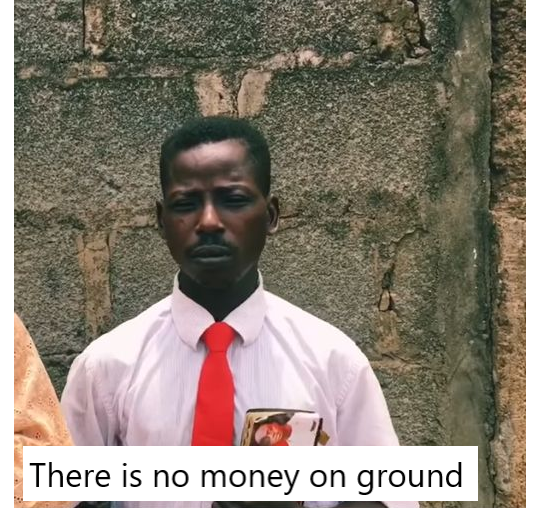
Yesterday I ran into a funny but ridiculous video on the WhatsApp status of an acquaintance who works for one of the leading Nigerian banks. The video was about a "peaceful meeting" that looked more like a protest held by many staff of heritage Bank at the premise of a certain Senator Andy Una about his unpaid loans.
A closer look at the story as covered by Sahara reporters showed that slightly more than 20 staff of Heritage Bank of Nigeria gathered in front of the residence of Senator Andy Uba to protest over his unpaid loans. The story carried that the bank staff was compelled to carry out this action due to fear of losing their jobs. One of the voices on record stated;
&"Senator Uba has been owing the bank for a couple of years now, and we are here for a peaceful meeting with him, very peaceful meeting. To ask him to kindly repay those loans, because they are depositors' funds.*
The person in the video of the "very peaceful meeting further stated that;
"Those monies, if they are not repaid, will throw the number of the people you see here, with their families out of work. And we know the situation of the economy now. If this number of people are thrown out of work, you know what it means.
This is Nigeria and a lot of ridiculous things happen all the time, but this one is somewhere at the top. I had a conversation with the acquaintance who posted the WhatsApp video and she alluded to a liquidity crisis in the country. In her words, she said
"Who will go and buy a house worth 1 billion Naira($2.5million). Banks(in Nigeria) hate collateral because it is not easy to liquidate. This(protesting) will be the first step to recover the loan, and if this fails, the bank can then liquidate his asset after he has filed for bankruptcy."
She then went further to say that perhaps it wasn't a bad idea to go to his residence, but it was a bad idea to hold a protest that went viral on social media. For what it's worth, I trust her judgment because she's one of the smartest people I know and she has experience in the banking industry, but looking at this situation emphasizes the importance of Defi in the crypto industry.
Liquid time bomb
Even without going too deep into the situation, even the blind man can tell that there's a liquidity crisis in various parts of the country's economy. In recent times, the Central Bank even offered loans to alleviate the liquidity crisis in the Power sector. In the banking sector, the story is much worst.

Again, without even looking too in-depth, it is clear to see that hunger and poverty has taken over the land. The poverty index in Nigeria is appalling, and virtually everything seems to be heading to the toilet.
So it comes as no surprise that banks find it difficult to liquidate collateral, so they have to hold protests before they get their money back. It is a sign of the times in the country but if they could just swallow their pride and give crypto a chance, all this would be fixed.
Smart contract for dumb money
Nigerian banks had been neutral about cryptocurrencies for a long time, and their stance was largely due to the general feeling of the apex bank. Naturally, they all agreed to the CBN's position on crypto and so, they don't facilitate crypto trade.
The irony is that assuming this loan had been conducted on a Defi lending platform, this liquidity situation would never have occurred. At this moment, there is at least $300 Billion worth of liquidity locked in various pools spread across Ethereum, Binance, Hueco, Matic, Rune, and many other chains with liquidity pools.
For Nigerian banks at least, tapping into the power of Defi pools will pretty much translate to an endless supply of liquidatable assets that could alleviate the liquidity crisis. I mean, these contracts are all open-source and accessible to anyone anywhere, so it's not like it will need that much work to implement.
Assuming banks decide to embrace crypto, accept the risk of unregulation and work with the open financial market that these assets provide, they will find themselves in a much better situation. Also, since smart contracts are code-based, banks will also not suffer from the "human factor".
Take it like this, Senator Andy Uba is a powerful man that has owed the bank for many years. Now, this is speculative but knowing how Nigerian politicians abuse power, it is not out of the question to think that he's employing some "federal might" to stall the acquisition of the collateral.
Well, smart contracts don't care about who you are and since cryptocurrencies have high liquidity compared to traditional assets like Real Estate(in Nigeria), embracing blockchain technology is the smart move. The use of blockchain technology will take power away from the oppressors and give it to the oppressed.
Also, banks that use smart contracts and embrace crypto have the extra edge of getting more people involved. This means sharing the profit and risk with potential investors in your liquidity pool. This approach also provides a safer playing field for all parties involved and ensures the safety of the bank's interest.
Please check out my Freelance gigs:
- I write insightful blog posts about, Finance, Fintech, blockchain and cryptocurrency at an affordable rate on Fiverr
- I write insightful football articles at an affordable rate on Fiverr
- I write insightful blog posts about, Finance, Fintech, blockchain and cryptocurrency at an affordable rate on AnyTask
Signup for Presearch: A search engine that pays you
Contact me
- Discord: belemo#9593
- Twitter: https://twitter.com/belemo__
- Telegram: uncleskipper
- Email: [email protected]

Posted Using LeoFinance Beta